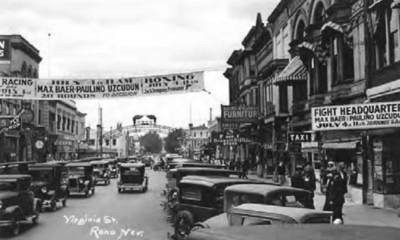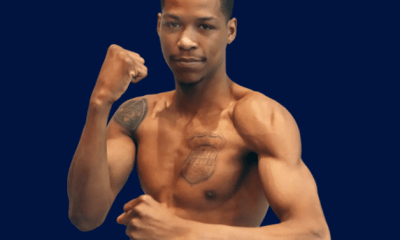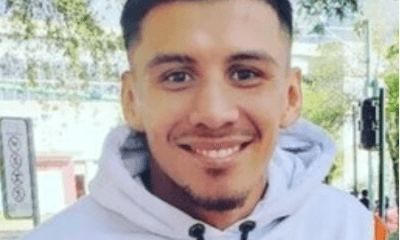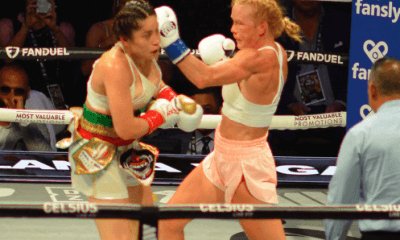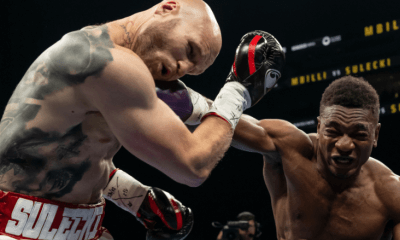Featured Articles
A Closer Look at Brian Mendoza who Aims to Steal the Show on the Tszyu-Fundora Card
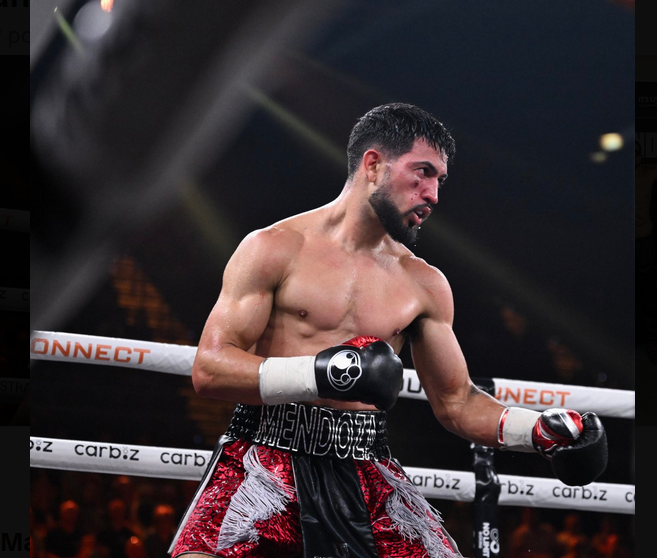
New Mexico native Brian Mendoza seized the moment when opportunity knocked. He has another opportunity next week in Las Vegas when he touches gloves with Serhii Bohachuk. Their fight at the T-Mobile Arena on March 30 will open the curtain on potentially a new era of boxing, marking the first foray of Amazon Prime PPV into the ancient sport.
Bohachuk was supposed to fight Sebastian Fundora who was bumped into the main event when Tim Tszyu’s original opponent Keith Thurman was forced to withdraw because of a bicep injury suffered in training. That left Bohachuk without an opponent, but not for long. Mendoza, who had been training diligently at Ismael Salas’s Las Vegas boxing academy, filled the breach in a hurry. They will compete for the WBC interim 154-pound title that Mendoza had vacated (yes, it’s confounding, but it’s an attractive match-up nonetheless).
Brian Mendoza, who turned 30 last month, grew up in Rio Rancho, a northern suburb of Albuquerque, the city that claims him. As an amateur, he trained at Fidel Maldonado’s Atrisco boxing school, Albuquerque’s most prominent facility. “It was a 40-minute drive each way,” he recalls, and a commitment that he had to juggle with school. Maldonado called Brian “the hardest worker I’ve ever had” and gave him his nickname “La Bala” (the bullet). “I was cool with it because it wasn’t too hokey,” says Mendoza, a late bloomer by amateur standards; he took up the sport at age 16.
Roughly half the population of metropolitan Albuquerque identifies as Hispanic or Latino, primarily Mexican. Mendoza is often pigeonholed as Mexican (“I look like a Mexican,” he says”), but is actually Cuban. Both of his parents were born in that island nation. They met in Albuquerque.
Mendoza grew up bilingual. “I still speak to my father in Spanish,” he says, “but have always spoken to my mother in English.” She has been in the U.S. longer, arriving at age nine after escaping Cuba with family members on one of the last vessels of the Mariel Boatlift.
Mendoza was inactive in 2018, but in the summer of that year made a life-changing decision, moving to Las Vegas to jump-start a career that had stalled after a 16-0 start. His entire family — his parents and a younger brother – made the move with him and they continue to live under the same roof.
In Las Vegas, it was inevitable that Brian would hook up with Ismael Salas. The noted trainer, he came to learn, hailed from the same neighborhood in Guantanamo as Mendoza’s father who found work in the U.S. as a trucker and truck mechanic.
Mendoza suffered his first loss on a Top Rank card in Las Vegas that included Oscar Valdez and Carl Frampton. He lost a split decision in an 8-round fight to a 9-1 opponent from Utah. Two fights later he suffered another setback, losing a 10-round decision to the highly-touted Jesus Ramos on a PBC card in Minneapolis.
Two fights later, back in Minneapolis, Mendoza was scheduled to appear on the undercard of a David Morrell fight. He wound up fighting in the co-feature instead when Jeison Rosario’s opponent fell out. Rosario was formerly a unified title-holder, holding the WBA and IBF versions of the world junior middleweight title.
In a major upset, Mendoza knocked out Rosario in the fifth round. A short right uppercut put the Dominican face-first on the canvas. He attempted to rise, but his legs were spaghetti and he fell back and the bout was waived off.
A much bigger upset would follow.
On April 8 of last year at an outdoor show in Los Angeles County, Mendoza KO’ d the aforementioned Sebastian Fundora. In the seventh round, he buckled Fundora’s knees with a vicious left uppercut and then flattened him with a right-left combination.
Defeating Fundora, then undefeated, was a tall order (pun intended). The “Towering Inferno,” who was comfortably ahead when Mendoza lowered the boom (he had won every round on two of the cards), had an 8-inch height advantage.
“I knew I was up against it going into that fight,” says Mendoza, looking back. “I was fighting a California fighter in a California ring with three California judges. My plan all along was to hang around and then take Fundora into deep water, taking it out of the hands of the judges.”
Mendoza and Fundora fought for the WBC’s “interim” 154-pound title. Brian vacated that title when he went off to Queensland, Australia to fight Tim Tszyu but, by some strange alchemy, had the belt re-instated. (Boxrec currently lists Mendoza and Jermell Charlo as WBC co-champions; don’t ask, we’re as confused as you are.)
Mendoza’s memories of Australia are bittersweet. “The Australians treated us great,” he said. “They made me an honorary Aussie.” Of course, all that congeniality ceased as soon as the bell rang. Widely considered the best fighter in the weight class, Tszyu successfully defended his WBO world super welterweight title with a unanimous decision.
“Man, he’s tough,” said the gracious Tszyu about Mendoza in the aftermath of the fight. “He’s slick, he has power. He’s world class for a reason.”
No one would seem more qualified to handicap the Tszyu-Fundora fight than Brian Mendoza who has shared the ring with both. Who does he like? “It’s an extremely interesting fight,” he says, “but I have to go with Tszyu who has a better base and is a more skilled counter-puncher.”
Brian has been in the ring with Tim Tszyu for more than 12 rounds.
Team Tszyu arrived in Las Vegas in mid-February and commandeered a private gym in the border town of Henderson. Brian Mendoza has been one of Tim’s regular sparring partners. “I’m a better fighter because of it,” he says.
This reporter caught up with the affable Mendoza several days ago at the Salas Boxing Academy. Before our chat, we watched him train. He ended the session with a rope skipping routine with a twist; he bounced up and down between skips to the rhythm of the Latin music playing on the loudspeaker, magnifying the cardiovascular benefit. It was mesmerizing.
We were reminded that when the legendary Sugar Ray Robinson skipped rope, everyone in the gym stopped to watch — so we have read. The Sugar Man subsequently incorporated a jump skipping routine into his nightclub act.
Robinson worked the nightclub circuit to keep his creditors at bay. Brian Mendoza, who attended the University of New Mexico, taking classes in nutrition and business and psychology (“I chose nutrition and business because I saw a tie-in with boxing and psychology just because I liked it”) isn’t likely to wind up in debt after his career is over. “I can promise you,” he says, “that I will not be another stereotype; I will be smart with my money.” When Mendoza references “my team,” he includes his accountant.
His accountant will have a much bigger stash to work with if Mendoza (22-3, 16 KOs) can get past Serhii Bohachuk (23-1, 23 KOs). A rematch with Fundora, should he upset Tim Tszyu, would be huge.
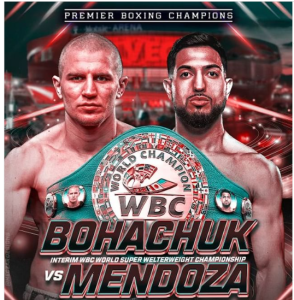
Mendoza-Bohachuk is a tricky fight to handicap, reflected in the fact that the oddsmakers were slow to develop a betting line. Although Mendoza has fought stiffer competition and has shown the ability to take a man out with one punch, Bohachuk is rated the harder puncher. The LA-based Ukrainian knockout artist is promoted by Tom Loeffler who previously handled the Klitschko brothers and Gennadiy Golovkin, among others.
Brian Mendoza is the “B-side” here and, if the opening line holds up, will go to post the underdog. But he’s been in this situation before and is brimming with confidence.
To comment on this story in the Fight Forum CLICK HERE
-

 Featured Articles3 weeks ago
Featured Articles3 weeks agoAvila Perspective, Chap. 330: Matchroom in New York plus the Latest on Canelo-Crawford
-

 Featured Articles2 weeks ago
Featured Articles2 weeks agoVito Mielnicki Jr Whitewashes Kamil Gardzielik Before the Home Folks in Newark
-

 Featured Articles4 weeks ago
Featured Articles4 weeks agoAvila Perspective, Chap 329: Pacquiao is Back, Fabio in England and More
-

 Featured Articles4 weeks ago
Featured Articles4 weeks agoOpetaia and Nakatani Crush Overmatched Foes, Capping Off a Wild Boxing Weekend
-

 Featured Articles3 weeks ago
Featured Articles3 weeks agoCatching Up with Clay Moyle Who Talks About His Massive Collection of Boxing Books
-

 Featured Articles4 weeks ago
Featured Articles4 weeks agoFabio Wardley Comes from Behind to KO Justis Huni
-

 Featured Articles1 week ago
Featured Articles1 week agoMore Medals for Hawaii’s Patricio Family at the USA Boxing Summer Festival
-

 Featured Articles4 weeks ago
Featured Articles4 weeks agoDelving into ‘Hoopla’ with Notes on Books by George Plimpton and Joyce Carol Oates

